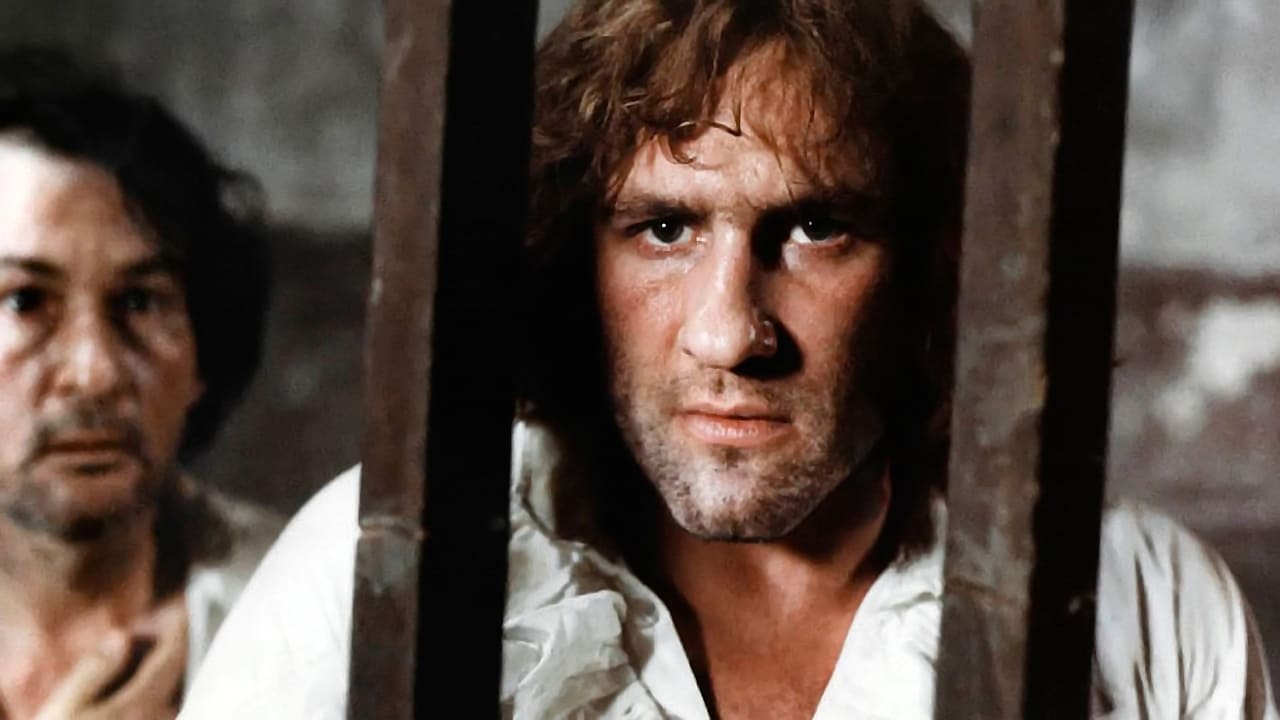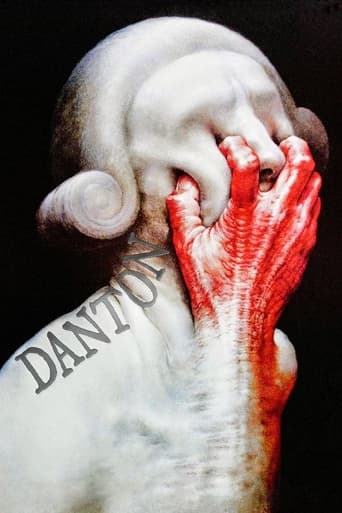

I'll be the first to admit I am far from an expert on the French Revolution. While my minor in college was history and I read regularly on the subject, the dismaying period of upheaval and chaos doesn't fit into the narrative of clean-cut history defined by the reigns of Kings and the administrations of Presidents. What I do know about it are the basic causes, the main factions and the end result. I am familiar with the names Maximillian Robespierre, Jean-Paul Marat, Louis XVI and Jean-Jacques Rousseau but I have never heard the name of Georges Danton. If I were to take a class on the subject I'd probably fail.It is the year 1793; the second year of the Republic and the infamous days of terror are in full swing. Danton, who is portrayed in the film by French actor Gerard Depardieu, makes his way into Paris to take his seat in the fractured General Assembly. His possible political machinations frighten the Revolutionary Tribunal headed by the cautious Robespierre played by Polish actor Wojciech Pszoniak. They all want to place his head promptly on the chopping block but Robespierre demands an audience with Danton first.Directed by Polish auteur Andrzej Wajda, Danton (1983) is a crash course in Republicanism run amok. Robespierre looks to create consensus between Danton's rival faction and the Tribunal. He doesn't like Danton but he understands his value as a man of the people and therefore is hesitant to simply round up his allies and take them to the guillotine. Yet the clanking machine he and Danton helped create is forcing him to take severe action to provide order. At one point in the film Robespierre laments no matter what course he takes, the revolution is dead.Depardieu's Danton is a boisterous foil to Robespierre's uptight revolutionary zeal. When he speaks, the whole room listens and his public bloviating is tempered by a genuine need for good. Yet Danton isn't a blind idealist like he claims the Tribunal to be. "People want peace, stability and bread, they don't care where it comes from," he mutters. He trusts the people of France to deliver him from execution and holds on to that ideal until the bitter end.The film's depiction of the reign of terror was meant to mimic the Solidarity trade-union struggle in Poland happening around the same time as the film's release. Solidarity was the first non-party controlled trade union in the Soviet block and was instrumental in spearheading free and fair elections in Poland. The foibles of that struggle were better highlighted in Wajda's earlier film Man of Iron (1981). Yet that film was released on the cusp of the martial law crackdown while Danton was released on the tale end of said crackdown. During that time Wajda fled to France after his production company in Poland had been pushed into bankruptcy by the Communist party. He directed two films before returning, the first was Danton and the second was A Love in Germany (1983).Unfortunately while Wajda's passion and personal bias are prevalent in Danton, his technique seems less assured than Man of Iron or his other political works. Part of it may have to do with his habit of employing Polish cinematographers including the famed Edward Klosinski. Outside his element in France, his cinematographer Igor Luther (Who also worked on A Love in Germany) likely wasn't on his wavelength.What results is an interesting history lesson and a lively discussion on political theory but a film that feels static and overly talkative. It provides little action or intensity and apart from the gravitas of Depardieu and Pszoniak, there's nothing holding it together. Even if you were to settle for an old-school cloak and dagger flick, Danton only delivers on the bare necessities. There are political maneuverings, alliances forged then displaced, etc. But it's all C+ work put together by an A+ director. As for the subversive elements that define this political drama? Let's just say it needs improvement.https://www.theyservepopcorninhell.blogspot.com
... View MoreThe 33 percent of the nations nitwits that still support W. Bush would do well to see this movie, which shows the aftermath of the French revolution and the terror of 1794 as strikingly similar to the post 9/11 socio-political landscape. Maybe then they could stop worrying about saving face and take the a**-whupping they deserve. It's really a shame that when a politician ruins the country, those who voted for him can't be denied the right to ever vote again. They've clearly shown they have no sense of character.What really stands out in this movie is the ambiguity of a character as hopelessly doctrinaire as Robespierre; a haunted empty man who simplistic reductive ideology can't help him elucidate the boundaries between safety and totalitarianism. Execution and murder. Self-defense and patriotism. His legalistic litmus tests aggravate the hopeless situation he's helped create. Sound like any belligerent, overprivileged, retarded Yale cheerleaders you know of? Wojciech Pszoniak blows the slovenly Deparidieu off the screen. As sympathetic as Robespierres plight is, it's comforting to know that shortly after the film ends he'll have his jaw shot off and be sent to the guillotine.
... View MoreCinema, at its best is entertainment. If one is to question every aspect with which one finds room for disagreement,and much of recorded history is based on contemporary opinions - often biased - then one should leave the cinema, because their prejudices will always spoil their enjoyment. When I spotted an airplane flying overhead in a film dated 33BC I was amused. The background scenery in "Casablanca" is absurdly fake. So, do I set up a moan & say that the film failed to convince? Fiona, relax and enjoy some excellent acting. Wajda's decision to cast the protagonists as French & Polish was inspired. one was immediately aware of which side each of the main characters was representing. No need to dwell on the authenticity of the wigs. This is powerful cinema. If there is a political message which is still relevant today - have a dinner party - a Château d'Yquem with the foie-gras; a Puligny Montrachet with the entree; some Polish Vodka sorbets and perhaps a 1961 Château Lafite-Rothschild with the beef - and discuss the political aspects of Danton until you drop with fatigue. Danton would surely have agreed?
... View MoreDalton- by Andrzej Wajda 1982 Wajda's `Dalton' is a superb movie in the great tradition and grand manner of a sweeping, dramatic historical epic. Danton, played with the perfect amount of bravura and zeal by Gerard Dieperdeu, is a one of the great pillars of the French revolution- he is fervently idolized, and as the leader of a huge publication, his power among the masses is immense and strong.He and his small band of intellectual fellow propagandists start criticizing the government- a fledgling one headed by Robiespierre (of the Revolutionary Committee) The latter cries foul, and is unwilling to slacken his desperate leash on the country through terror and force. The people are starving and scared, and faced with those who "have nothing to lose but their chains" (to quote appropriately from Marx), the Committee gets downright nasty.The film is a monumental narrative of the clash between these two mighty and principled men, culminating in the beheading of one of them. (of course you already know who the unlucky guy is if you know your world history). Underneath all the braggadocio and hedonism, Danton's indomitable will becomes awesome and meaningful. A less artistic director could have turned him into a caricature.Like Dostoevky, the director confronts the viewer with the tragic grandeur of humanity- but in this case, the tragedy of the "historical process" and necessity for revolution.Do we really attain true freedom, democracy and "liberty, fraternity, equality" when the people are starving and the leaders are using scare tactics? When do you justify a revolution and when do you call it mindless? Do revolutions and does great historical epochs happen by necessity or by the whims, caprices and action of A Few Good Men like Danton and Robiespierre, Bonaparte, etc. These are among the questions this urgently controlled movie bombarded me after firmly engaging my emotions and intellect.Indeed, the director pulls no punches but takes some well-aimed, unerring swipes at our old-fashioned ideas about politics. The story is set in the 1790s, but its message still boomerangs to this very day. Wajda presents us with a subject that could degenerate into propaganda but instead is shaped into great art- one that is done with great narrative force and in the heart's blood.
... View More